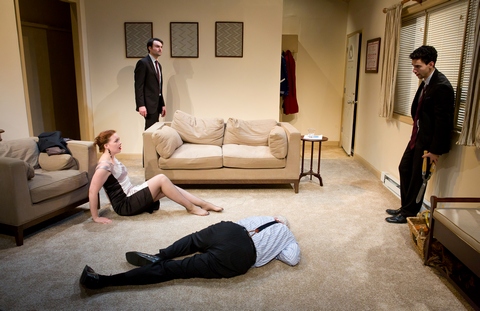No One Loves Us Here
A British playwright’s irreverent, amusing, and scathing critique of the ever-elusive American Dream that is more cerebral than heartfelt.

Jessica Kitchens, Christian Ryan, Dick Hughes (on floor) and Anthony Michael Irizarry in a scene from New Light Theater Project’s production of “No One Loves Us Here” (Photo credit: Hunter Canning)
[avatar user=”Daniel J. Lee” size=”96″ align=”left”] Daniel J. Lee, Critic[/avatar] Have you ever said you wanted to kill someone you love? Have you ever actually meant it? No One Loves Us Here, Ross (Picture Ourselves in Latvia) Howard’s new play appearing at Urban Stages, addresses this very question. Through a series of escalating instances of domestic violence, the British playwright aims to explore the fantasies and boundaries of some of societies most revered members—businessmen, homemakers, and other ostensibly hard workers. The result is an irreverent, amusing, and scathing critique of the ever-elusive American Dream that is more cerebral than heartfelt.
Set in a suburban, upper-class California living room, No One Loves Us Here chronicles the demise of a married couple’s seemingly idyllic life. On the surface, Mr. and Mrs. Beaumont appear to have it all: he maintains a white collar job and active social life while she enjoys afternoons of garden pruning and homemaking. However, the status quo begins to change when Washington, the 19-year-old Native American video store clerk (do people still patronize video stores in 2015?), arrives in the neighborhood and strikes up a conversation with Mr. Beaumont. As the two get to know each other better, the young husband reveals his most sincere desire to have his wife murdered; Washington agrees to help in exchange for free rent in the family guest house. Thrown in to complicate matters are Jack, Mrs. Beaumont’s misogynistic father, and Amber, the attractive, nosy neighbor with secrets. The façade of dignity and decorum crumbles as the groups’ opposing family backgrounds, gender roles, and socioeconomic upbringings clash.
The play is aptly named: while Howard’s characters are too fascinating to dismiss, they are also too frigid to care about. Clearly most interested in the political and sociological implications of American suburbia, the playwright forgoes emotional depth and vulnerability in favor of insults and violence. Even his eminently relatable housewives Mrs. Beaumont and Amber are reduced to manic, quasi-comedic sketches that ask little empathy of their audience.

April Kidwell and Christian Ryan in a scene from New Light Theater Project’s “No One Love Us Here” (Photo credit: Hunter Canning)
Likewise, Jerry Heymann’s visceral and vulgar direction emphasizes the play’s moral depravity and brutality. Not afraid of stage slaps, stomach punches, or head wounds, Heymann and fight director Scott Barrow frankly depict this dysfunctional family’s darkest desires. Throughout the evening, the cast litters set designer Brian Dudkiewicz’s appropriately sterile and charmless living room with cigarette ashes, weapons, and bodily fluids.
The No One Loves Us Here ensemble cast of undercover miscreants is similarly devious, each trying hard to mask their latent, dangerous capabilities. While Christian Ryan hides Mr. Beaumont’s homicidal urges behind a shield of professionalism, Jessica Kitchens veils Mrs. Beaumont’s sorrows in a numbing curtain of vodka. Likewise, Dick Hughes cloaks Jack’s bigotry in an air of authority, and April Kidwell covers Amber’s sexual frustrations in a layer of makeup. Anthony Michael Irizarry, however, proves to be the most volatile; from the outset, his perceptive and wounded Washington appears fragile enough to crack at any moment. And, boy, does he crack!
Howard’s new work illustrates the characteristically 21st Century sentiments of unbridled selfishness, feigned apathy, and perennial discontent. His pointed, political indictment of our skewed American values is simultaneously too hard to watch and too illuminating to ignore. No One Loves Us Here is an entertaining, engaging bloodbath that leaves its audience thinking lots and feeling little. Perhaps this is as it should be.
No One Loves Us Here (through February 7, 2015)
New Light Theater Project
Urban Stages, 259 West 30th Street, in Manhattan
For tickets, call 630-632-1439 or visit http://www.BrownPaperTickets.com
Running time: one hour and 50 minutes with one intermission






Leave a comment